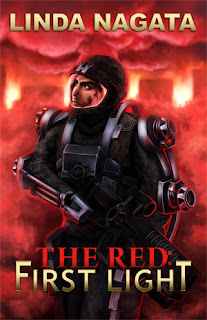Today was the final day of
Diversicon 21, the science fiction and fantasy convention that is finally "Old Enough To Think", as its theme said this year. I didn't get to see much of our Guest of Honor, Jack McDevitt (our schedules didn't coincide much) but I did moderate an interesting panel on "the Grimdark" trend in current fantasy with Special Guest Roy C. Booth and
Rachel Gold, as well as having a chance to chat once or twice with our other Special Guest,
Catherine Lundoff, who was wonderful as both a guest and as a regular Diversicon participant.
I did have the fortune to have the winning bid on Melissa Scott's new novella,
Point of Knives, a Kusherite fantasy set in the world of Astreiant, which she created with her late partner, Lisa Barnett. Thanks so much to Catherine Lundoff for donating this and several other wonderful books
to the auction!
Cordwainer Smith was one of the Posthumous Guests at the con. I moderated a panel on Cordwainer Smith and Transhumanism which I thought went pretty well.
Rachel Kronick and Katie Ferriera did a great job as my co-panelists, and Dwayne H, Olson (see below) made useful contributions from the audience. One conclusion that we reached is that while Smith's fiction has many of the trappings of transhumanism, he was much more of a humanist than a transhumanist at heart.
I had also prepared a Cordwainer Smith-inspired
Doctor Who game, powered by FATE Accelerated Edition, but we didn't quite have critical mass to run the game. So that scenario will debut at Con of the North in February 2014.
There was a second panel on Cordwainer Smith today, in which we explored the range of Smith's SF works in a specific context: Cordwainer Smith wrote "Myths From the Far Future" which managed to be mysterious, evocative, and poignant reflections on the human condition in far-distant times. Eric M. Heideman moderated the panel, and we were very fortunate to also have Dwayne H. Olson, who published Smith and is an expert on his work. Katie Ferriera was another wonderful contributor to the "Myths" panel and continued to share her insights based on her very solid understanding of Smith's stories.
During the panel, I shared my thoughts about some of the writers that Smith has influenced:
- Frank Herbert's Dune universe owes a LOT to Cordwainer Smith (see Smith for the life extending drug stroon, which is a highly prized interstellar commodity, for ornithopters, a revolution on a desert planet, and the dier-dead, which are much the same as Herbert's gholas)
- M.A.R. Barker worked a couple of Smith references into the background of Tekumel: both his Lords of Humanspace (who are reminiscent of the Lords of the Instrumentality in Smith's fiction) and the "Hegemony of Man", Barker's handwritten corrections in a proof of Empire of the Petal Throne (this language is reminiscent of Smith's Instrumentality of Mankind, and the Rediscovery of Man).
- +Sarah Newton's Mindjammer novel and RPG, a far future space opera setting that is influenced by Cordwainer Smith (among other SF greats).
Today I was able to attend two other terrific panels:
- Greg L. Johnson and Russell Letson's "What Do I Read Next?" panel, and
- A panel in honor of the late Iain M. Banks, moderated by Martha Hood, with co-panelists Greg L. Johnson, Rachel Kronick, Russell Letson, and Kelly Strait.
The former panel is a Diversicon staple and not to be missed. In particular, I'll be looking out for Chris Moriarty's SF trilogy which starts with
Spin State, Paul McAuley's Evening's Empires, and Linda Nagata, who after a number of years away from publishing, has a new book out,
The Red: First Light.
 |
| Cover art by Dallas Nagata White |
The Iain M. Banks panel was quite good, and has inspired me to go back and try again to read more Banks. I read Banks'
Transition and found it only-so-so. I have tried to get through
Consider Phebas a few times, but always stall out about mid-way.
Banks' hostility to religion irritates me. I am a Marxist but I find this anti-religious sentiment on the part of a supposed leftist both irritating and typical; it smacks of what the British did "best": conquer people, and then look for reasons to justify the crimes of their empire based on their victims' alleged cultural and religious inferiority.
But I digress.
The panel has inspired me to find a copy of
Against A Dark Background, a non-Culture novel which Rachel Kronick described as having a group of characters who are reminiscent of the kinds you'd find in a PC party in a roleplaying game.
So much to read! So little time!
I am already looking forward to next year!














